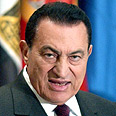
Egyptian President Hosni Mubarak
Photo: API
Egypt has handed down new media requirements that will effectively put all live broadcasts, including TV talk shows and news bulletins, under the control of state television.
Critics say a sequence of new restrictions on journalists is intended to stifle Egypt's vibrant media landscape a month before parliamentary elections in the authoritarian country.
In the latest measure, the telecommunications regulator is canceling the permits of private companies providing live broadcast services in Egypt, requiring them to get new licenses from state television, several of the companies said on Wednesday.
Egypt Elections
Roee Nahmias
Kuwaiti paper al-Dar says Secretary of State Hillary Clinton relayed presidential message urging free, transparent elections to Mubarak during Sharm el-Sheik peace meeting
The government measures could be an attempt by authorities to tighten their grip on information and media commentary as Egypt's political scene becomes increasingly tense before the parliamentary vote and a presidential election next year.
There is widespread discontent over increasing poverty and rising food prices. Vocal opposition figures have emerged and inspired young activists to call for democratic reforms. Resistance to the idea that Hosni Mubarak could pass the presidency to his son is also growing.
Several private broadcast service providers said on Wednesday that they received letters from the telecom regulator ending their standing permits to offer live broadcast feeds from Egypt starting from Friday.
Nader Gohar, the owner of one of the affected companies, said the steps to acquire new licenses are unclear and are buried in red tape and crippling requirements. Violators could face jail time.
"I've had to cancel booking and broadcasting for news stations during the parliament elections," said Gohar, who runs Cairo News Company.
On Tuesday, the same regulatory body also set new rules for companies sending text messages to multiple mobile phones, a step that activists say will stifle efforts to mobilize voters before the elections, which are to be held in the last week of November.
Last week, the Egyptian Journalists' Union accused the government of cracking down on media critical of authorities, and the leading independent daily Al-Dustour fired its chief editor, outspoken government critic Ibrahim Eissa.
Live broadcasts and other media coverage during the 2005 parliamentary elections were instrumental in exposing some of the widespread violations and violence.
Since then, talk shows and live broadcasting of political developments in Egypt have expanded, and government critics use the programs to air grievances that have left practically no government official untouched.
The owner of another broadcast services company said the new requirements could result in him shutting down his business if his application for a new permit is denied. He also said it is illogical to force companies to ask for permits from state TV because it offers the same service and is a competitor.
He spoke on condition of anonymity because he did not want to draw attention before the new licensing procedures are completed.
- Follow Ynetnews on Facebook















